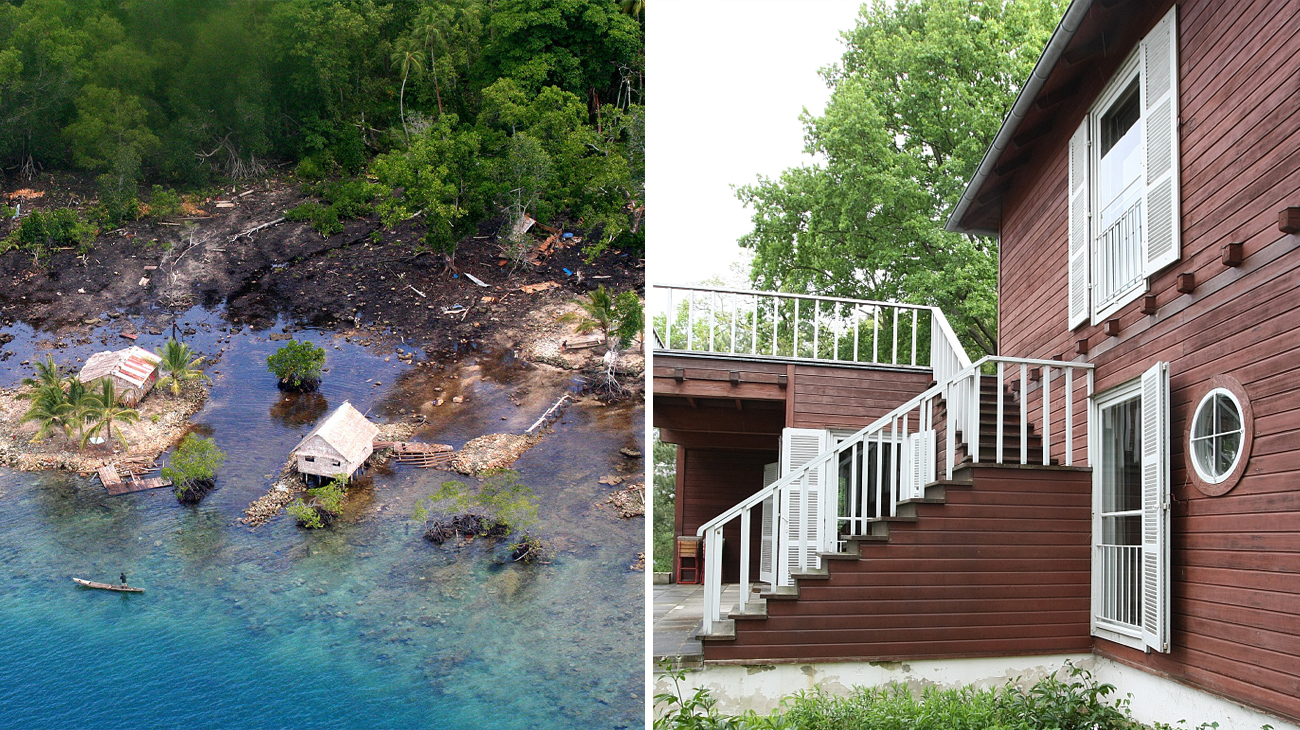The relocation of Taro Island
As rising seas threaten the Solomon Islands, one community is planning a move to higher ground.
[L] Post-tsunami destruction in the Solomon Islands in 2007. Credit: Australian Department of Foreign Affairs and Trade/AusAid via CC by 2.0. [R] Einsteinhaus, Caputh, designed by Konrad Wachsmann. Credit: Stephan M. Höhne via CC by 3.0
The Deborah J. Norden Fund, a program of The Architectural League of New York, was established in 1995 in memory of architect and arts administrator Deborah Norden. The competition awards up to $5,000 annually in travel grants to students and recent graduates in the fields of architecture, architectural history, and urban studies.
On 2018, the Architectural League awarded two travel grants. One went to Emma Benintende for her proposal “On relocation: Participatory design strategies for climate change–induced migration.” Benintende will travel to Brisbane, Fiji, and the Solomon Islands to research and document relocation efforts of coastal communities due to climate change.
The other grant went to Nicholas Moore for “Relatively generic: Wachsmann’s house for Einstein.” Moore will travel to Germany to visit prefabricated houses designed by Konrad Wachsmann, with a particular focus on the wooden cottage he built for Albert and Elsa Einstein in 1929.
According to the United Nations, 21.5 million people have been displaced due to the effects of climate change each year since 2008. Emma Benintende will research relocation plans in the Pacific Small Island Developing States (PSIDS), where several towns and villages have been relocated or are in the process of collective migration due to sea level rise. Through firsthand observation, analysis of government policy, and project documentation, as well as meetings with planners and community members, Benintende aims to produce a guide to relocation planning strategies, focusing specifically on the role of the architect in these efforts.
Emma Benintende received an MArch from Princeton University and a BA in the history of science from Harvard University.
In order to study Konrad Wachsmann’s prefabricated wooden buildings and understand his important, yet underestimated role in the history of architecture, Nicholas Moore will visit Wachsmann’s archives and his few surviving buildings in Germany. According to Moore, the wooden cottage Wachsmann built for Einstein in a matter of weeks in 1929 represents a transitional period in the architect’s career, combining the unique and the generic, the crafted and the industrial.
Moore aims to investigate the cottage for its “relatively” generic form in order to apply similar wooden construction techniques in his own architectural practice. His research will also result in a catalog of Wachsmann’s built works consisting of drawings and photographs emphasizing process, materials, and details. Moore believes the wooden systems developed by Wachsmann could inspire current efforts to solve the housing shortage in American cities.
Nicholas Moore completed postgraduate research in urban studies at the Strelka Institute for Media, Architecture, and Design in Moscow, Russia. He holds an MArch from the Rhode Island School of Design and a BA in history of architecture and comparative literature from Brown University.
Anthony Leiserowitz discusses American perceptions about the threat of climate change.
A panel discusses race, sustainability, and the intersection of the two.
A Current Work lecture by Mexican architect Alberto Kalach, followed by a discussion with Brad Cloepfil.
